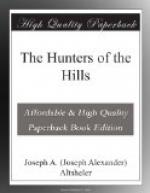“I see two,” said the Onondaga, “and doubtless there are others whom we cannot see. Keep close, my friends, I think they are going to fire.”
A dozen rifles were discharged from a point about a hundred yards away, the exploding powder making red dots in the darkness, the bullets rattling on the stone cliff or sending up little spurts of water from the river. The volley was followed by a shrill, fierce war whoop, and then nothing was heard but the flowing of the river and the rushing of the rain.
“You are not touched?” said Tayoga, and Robert and Willet quickly answered in the negative.
“They don’t know just which way to aim their guns,” said Willet, “and so long as we keep quiet now they won’t learn. That shout of yours, Tayoga, was not enough to tell them.”
“But they must remember about where the hollow is, although they can’t pull trigger directly upon it, owing to the darkness and storm,” said Robert.
“That about sums it up, my boy,” said the hunter. “If they do a lot of random firing the chances are about a hundred to one they won’t hit us, and the Indians don’t have enough ammunition to waste that way.”
“I don’t suppose we can launch the canoe and slip away in it?”
“No, it would be swamped by the rain and the flood. It’s likely, too, that they’re on watch for us farther down the stream.”
“Then this is our home and fortress for an indefinite time, and, that being the case, I’m going to make myself as easy as I can.”
He drew the blanket under his body again and lay on his elbow, but he held his rifle before him, ready for battle at an instant’s notice. His feeling of comfort returned and with it the sense of safety. The bullets of the savages had gone so wild and the darkness was so deep that their shelter appeared to him truly as a fortress which no numbers of besiegers could storm.
“Do you think they’ll try floating down the stream on trees or logs again, Tayoga?” he asked.
“No, the danger is too great,” replied the Onondaga. “They know now that we’re watching.”
An hour passed without any further sign from the foe. The rain decreased somewhat in violence, but, as the wind rose, its rush and sweep made as much sound as ever. Then the waiting was broken by scattering shots, accompanied by detached war whoops, as if different bands were near. From their shelter they watched the red dots that marked the discharges from the rifles, but only one bullet came near them, and after chipping a piece of stone over their heads it dropped harmlessly to the floor.
“That was the one chance out of a hundred,” said Willet, “and now we’re safe from the next ninety-nine bullets.”
“I trust the rule will work,” said Robert.
“I wish you’d hold my left hand in a firm grip,” said Willet.
“I will, but why?” returned the youth.
“If I get a chance I’m going to drag up some of that dead and floating wood and lay it along the edge of the shelf. In the dark the savages can’t pick us off, but we’ll need a barrier in the morning.”




